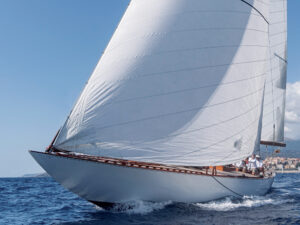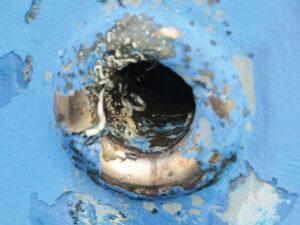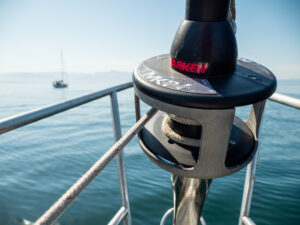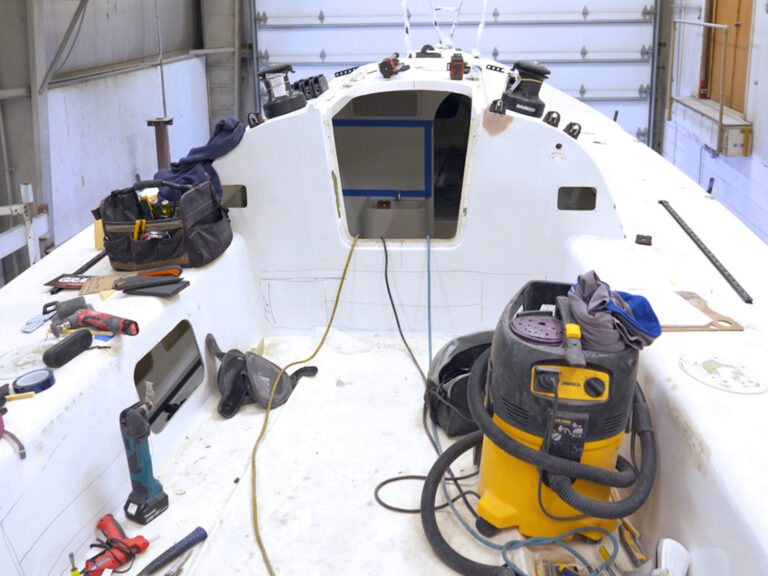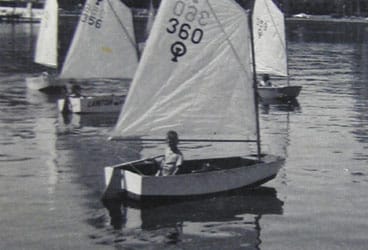
Goodlander Opti
I was skipping small, flat stones into Vinoy Basin, in St. Petersburg, Florida, while waiting for my father. I believed that, perhaps, I was the best stone skipper in the whole universe—well, at least for my age group. My lucky coin was in the pocket of my torn shorts. The rabbit’s foot was tied around the piece of string I used as a belt. I was shoeless, hatless, shirtless, and brown as a berry. Huck Finn had nothing on me. But I was confident. My father would bring good news. My father had to bring good news.
I tried not to look him in the eye as he approached from the Vinoy Optimist Youth Sailing Program. He was walking slow. That wasn’t good. Even worse, he had that look of solemn compassion on his face. I knew I was sunk.
He bent down in front of me, smiled, smoothed my cowlick, and grabbed both my arms. I could tell he wanted to hug me but was holding off. This was man-to-man stuff. “No exceptions, son,” he said. “Yacht racing is all about rules, and they can’t bend theirs for you. You’ll have to wait.”
I didn’t say anything. I didn’t cry. After all, I wasn’t a baby. So I just blinked and blinked through damp eyes.
A few days later, when I was finishing up my breakfast at the galley table of the schooner Elizabeth at slip number seven, I lost my temper with my mother.
“But I don’t want to be 8 and a half years old anymore!” I screamed at her as I climbed down from the seat and dashed up the companionway ladder into the cockpit. “I’m sick of 8 and a half!”
I could see my sisters glance at each other as I scooted by. They knew. Everyone knew. It was Saturday.
Time hung heavy. Flies buzzed. It was going to be another St. Petersburg and Tampa Bay scorcher. I sighed as I rummaged around the dock box. Finally, I selected a medium-sized engine. I filled my engine—which looked a lot like a coffee can with a small hole punched in it—with water and went zooming around the marina while making motorcycle noises. This used to be the most marvelous thing in the world for me to do—but not any longer. I wanted to drive something real. Not pretend. Not make-believe. Real!
Each time my coffee can would empty, I’d pull over to the nearest slip’s water faucet and refuel.
I kept glancing at my Timex wristwatch. I’d found it while diving under Ranger III, Dave and Irene Winter’s massive steel head-boat that went to Mullet Key each day. They’d hired me to find a wallet that had been dropped overboard, and I’d ended up finding both. But my new watch didn’t have a five-minute timer with an alarm. I’d have to wait until I was an adult for that.
I returned to Elizabeth at 0915 and asked respectfully, “Permission to use the ship’s binoculars, please.”
“Granted,” my father said. “I’ll hand them up to you if you want.”
I wanted. So I shinnied up the outermost dock piling, and then bent down to grab the binocks from my father. There were about a dozen Optimist prams milling around the harbor. I had a perfect view of the racecourse. The floppy-hatted guy in the skiff with the outboard was setting out the marks. Sometimes, if the wind changed, he’d move them. The first leg would be to windward, always.
Here came the Opti named Fourth Avenue Cleaners. She was fast. But today she flew the mainsail with the number 23 on it, which was all bagged out. If she’d had sail number 31, she’d be unstoppable.
I wondered if they intentionally put the slower sails on the faster boats—or maybe they didn’t pay any attention. If it was random, that could be used to an advantage. On the other hand, if it wasn’t random, that, too, could be used. Knowledge was power, especially on the racecourse.
The gun went off. Sixteen boats scooted across the starting line. Four of them kept going on starboard tack until they ran out of wind, shadowed by the row of palm trees by the water’s edge. Dummies. All the smart ones had tacked away just before sailing into the hole. Pressure was important. It was like the gas pedal, my father said.
“Cookies?” my mother asked. She was on the dock now, too, with my sisters. The whole family was watching.
“Sure,” I said and reached down for a handful. A yacht racer had to keep up his strength.
“Which tack did they start on?” asked my father.
“Starboard, mostly,” I said. “Because the starboard-tack vessel has rights over a port-tack vessel.”
“Correct,” he said. “And it’s best to keep in the middle of the course and to stay with lifts and tack on headers.”
I wasn’t too sure what that meant, but I was too busy watching the action at the top mark. I could hear them screaming at each other: “Starboard!” and “Room!” and “Mast abeam!”
“Why so tilted now?” I asked my father.
“Boats are heeled, son, never tilted,” he told me. “Pinball machines are tilted! Anyway, in light airs downwind, the clever skipper heels the vessel so that the sprit-rigged mainsail gets max exposure to the higher winds aloft and the boat’s wetted surface is reduced. Look at number 27 scoot!”
“That’s Tall Guy,” I said, having assigned each an arbitrary name. “He’s always in the top three. He’s good.”
“I noticed he hiked hard and sailed flat on the first beat,” said my father.
“What are the black things fluttering?” asked my sister Gale.
“Telltales,” I said wisely. She might be older, but she didn’t watch with the same intensity as I did. “They tell how the air is moving over the sail.”
“When you’re sailing to windward,” my father said, “they should be streaming aft and slightly lifting if everything is trimmed right.”
A sustained puff of wind blew through the harbor.
“See how the leaders moved aft in their boats?” said my father. “Those in the back of the fleet didn’t, so they’re even farther behind now.”
Gradually, my mother and sisters drifted away, but my father and I studied every race, each tack, and all the shifts. I was mesmerized. I’d recently learned how to play chess, but this was 10 times better and more exciting. It was like chess on the water with pieces you could steer. Sometimes I’d get so excited watching that I’d have to tightly clamp my legs together to keep from peeing. By noon, it was all over. With the prams put away and the kids gone, the sailing coaches locked the chain on the fence that kept out the landlubbers. I’d have lunch with my parents and then tell them I was going for a row around the harbor.
My personal dinghy was an old, nameless fishing skiff that had floated into the harbor awash; it was missing an entire bottom plank. I’d tied it up to the seawall for months before my father would allow me to claim salvage rights. Sawing the plank to the right size took forever—the hand ripsaw was too large for me. It weighed a ton. My father would spell me for a few minutes, then quickly hand it back to me: “If it’s going to be your boat, son, then it has to be your blood, sweat, and tears, too.”
Nailing on the plank wasn’t difficult. I used bronze Anchorfast nails. I predrilled the holes and used plenty of goop. Some of the nails bent over, and I had to remove them and start afresh. Afterward, she was tight as a drum. But she was big and heavy and I was light and small—and it took everything I had in me to row it over to the Opti dock across the windy harbor and tie it up.
The fence was to keep out the landlubbers. I was a sailor. And my vessel was the key to this delicious privilege. I was, of course, careful not to touch anything or make a mess. But I’d spend the rest of the afternoon looking at the faster prams and wondering why, why, why?
Smooth hull? Lighter? Better shape? Stiffer? All of the above?
Looking back, I guess I was lonely, real lonely. But at the time, I just thought of myself as solitary, introverted, and studious. I wanted to begin life, not wait for it.
I’d mentally rehearse carrying a pram from the rack to the water. I knew, from hiding behind some nearby palms and listening, that the flip was the hard part. I was slight of build, and I knew I’d have to make up for my lack of big-kid muscles with grace and timing.
Finally, after about what seemed like a hundred years, my ninth birthday arrived. My father gave me a used copy of the international yacht-racing rules. Mother presented me with a pair of sailing gloves, which she’d put on layaway at Maas Brothers many months before. Sisters Gale and Carole had hand-sewn a bright-red protest flag.
Father brought me down to the clubhouse. We were too early—but I’d rather wait for an hour than lose a second.
“Show ’em,” said my father when the organizers arrived.
I pulled out my birth certificate, unfolded it carefully, and pointed to my birthday of February 2, 1952. I was 9 years old, for sure.
The coach—his name was Harold, but I still thought of him as Mister Floppy Hat for most of that first year—smiled and said, “OK, son. Welcome aboard.”
Up until this point, I’d never sailed alone. Sure, I’d spend many hours at the helm of Little Liz, our 10-foot clincker-built sailing tender, but always with my father in the vessel. The first time I took a pram out alone, it was a windy day. I couldn’t believe the acceleration. It was so much fun and so scary-thrilling that I couldn’t stop giggling. I still giggle to this day when my vessel picks up her skirts.
Just as I suspected, flipping the Opti wasn’t easy. The 15-year-olds who dominated the clubhouse didn’t give me a break—they wanted to make a fool of me the first few times I tried. But I was ready. I’d found my tribe at last. These were my people. This was my world. And I burned with the desire to learn every single thing about it that I could—right down to the tiniest, least significant speck of knowledge.
A seat wasn’t a seat. It was a thwart. You didn’t steer with the rudder—the rudder was in the water; you steered via the tiller. It was like a secret language: gooseneck, sprit, trunk, chine, peak, throat, gudgeon, downhaul.
And I knew this language, this world, these rules—and the adult landlubbers ashore did not. This made me special. This made me proud.
Success around the buoys, of course, wasn’t immediate. I was almost 12 when I won the top annual prize—the youngest sailor ever to do so at that public club. (The sailors at the other Opti group in town, sponsored by the St. Petersburg Yacht Club, sailed much faster than we did.)
In the intervening 50 years, I believe that I’ve led a very event-filled life. I’ve sailed around the world. I’ve won my share of races in New England, Bermuda, Antigua, and Sint Maarten. I’ve written books about international cruising. I’ve broadcast numerous local, national, and international radio shows about being a sea gypsy. Why, I’ve even climbed up to the masthead of this magazine, which I consider the pinnacle of success in my chosen field. But to be perfectly honest, I’ve never had as much fun as I had while steering an eight-foot Optimist pram when I was 9 years old—while trying not to pee with the bladder-draining excitement of it all.
Cap’n Fatty Goodlander, who’s now lived aboard for more than 50 years, is preparing to slap some anti-fouling on Wild Card_ for another summer of Mediterranean fun. His latest book is Red Sea Run._

